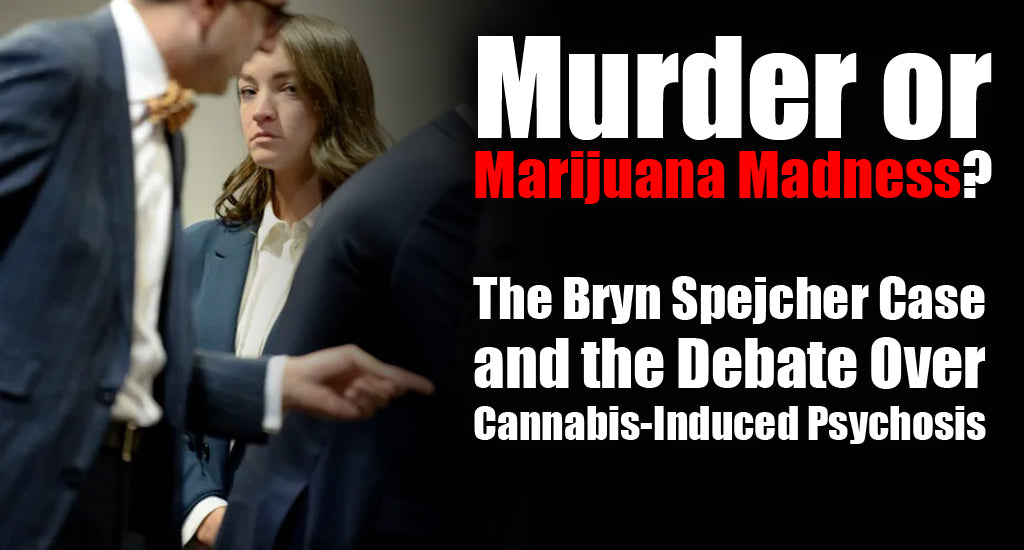
Murder or Marijuana Madness? The Bryn Spejcher Case and the Debate Over Cannabis-Induced Psychosis
In a recent and controversial court case, Bryn Spejcher, a 32-year-old California woman, was convicted of involuntary manslaughter but received a sentence of only two years of probation and 100 hours of community service. This verdict came after she fatally stabbed Chad O’Melia, whom she had been dating for several weeks, more than 100 times in an episode described as "cannabis-induced psychosis."
The decision by Ventura County Superior Court Judge David Worley, which hinged on the claim of cannabis-induced psychosis, has sparked widespread debate and outrage, particularly from the victim's family. This article seeks to explore the intricate layers of this case and delve into the scientific understanding of cannabis-induced psychosis.
The Bryn Spejcher Case: A Detailed Overview
In the Bryn Spejcher case, the events unfolded in May 2018 when Spejcher and Chad O’Melia, her then-boyfriend, were using marijuana in his apartment. During this session, Spejcher experienced an extreme reaction, leading to a psychotic episode. This episode escalated dramatically, resulting in Spejcher attacking O’Melia fatally.
The nature of Spejcher's reaction and its link to the cannabis use became a pivotal aspect of the trial. The defense argued that the marijuana consumption triggered a psychotic disorder in Spejcher, a claim that was heavily scrutinized throughout the legal proceedings. The argument centered around the concept of cannabis-induced psychosis, a controversial and somewhat nebulous term in medical and legal contexts. This claim was critical in shaping the outcome of the case.
The court's decision to sentence Spejcher to probation rather than prison time was influenced by this argument. The judge, acknowledging the role of the alleged cannabis-induced psychosis, opted for a sentence that focused more on rehabilitation and public awareness rather than punitive measures. This sentencing decision sparked a significant debate, highlighting the complexities of addressing substance-induced mental health issues within the criminal justice system.
Cannabis-Induced Psychosis: A Scientific Perspective
Cannabis-induced psychosis is a complex and multifaceted issue in the realms of psychiatry and neuroscience. While a definitive causal relationship between cannabis use and psychosis is still under investigation, research has indicated an association, particularly in individuals with certain risk factors.
For instance, cannabis use has been linked with an earlier onset of psychotic disorders, such as schizophrenia, especially in individuals who have a genetic predisposition or a family history of these disorders. Additionally, high doses of cannabis can induce temporary psychotic episodes in some individuals. These episodes may increase the risk of developing a psychotic disorder later in life. The interplay between cannabis use and mental health is influenced by various factors, including the amount and potency of cannabis consumed, the frequency of use, and the individual’s age at first use.
It's also important to consider that many factors influencing mental health, like genetics, trauma, and stress, also affect the likelihood of cannabis use, making it challenging to establish a clear cause-and-effect relationship. Given these complexities, ongoing research is essential to fully understand the implications of cannabis use on mental health.
Analyzing the Legal and Social Implications
The legal and social implications of the Bryn Spejcher case, where cannabis-induced psychosis was a pivotal factor, are multifaceted and have sparked significant debate. In this case, Spejcher was convicted of involuntary manslaughter but received a notably lenient sentence after fatally stabbing a man she had been dating. The defense argued that her actions were the result of a "cannabis-induced" episode of psychosis, a claim that has raised numerous questions within the legal community.
Cannabis-induced psychosis is a condition that has been acknowledged in the medical community, but its prevalence and impact continue to be areas of ongoing research. Studies have shown a correlation between high-potency cannabis use and an increased risk of psychosis, particularly in individuals with a predisposition to mental health disorders. A landmark study in The Lancet Psychiatry suggested that daily cannabis users, especially those consuming high-potency strains, are at a significantly higher risk of developing psychotic disorders compared to non-users. However, the causal relationship between cannabis use and psychosis is not conclusively established and is subject to ongoing scientific investigation.
In the legal sphere, the use of cannabis-induced psychosis as a defense in violent crime cases, such as that of Spejcher, remains controversial and heavily dependent on psychiatric evaluations and expert testimony. While some experts argue that the condition is relatively rare and often overemphasized, others highlight the potential risks associated with increasing potency of cannabis strains available in the market. The need for awareness and education regarding the mental health implications of cannabis use, especially among young people and those with a history of mental illness, is emphasized by experts in the field.
The sentencing in the Spejcher case has been met with mixed reactions. Some view it as a failure of the justice system to adequately address a serious crime, while others see it as an acknowledgment of the complex role that mental health can play in criminal acts. This case underscores the need for a balanced approach in the legal system that recognizes potential risks without overstating them, ensuring informed decisions by both users and policymakers.
The discourse surrounding cannabis legalization and criminal justice also reflects an alarming inconsistency in the treatment of cannabis-related offenses compared to violent crimes. The leniency of sentences in cases like Spejcher's, where severe acts of violence receive minimal punishment, raises questions about societal values and priorities, particularly when contrasted with the harsh penalties often imposed for non-violent cannabis offenses.
Conclusion
The Bryn Spejcher case opens up critical conversations about the intersection of drug use, mental health, and criminal justice. While the role of cannabis-induced psychosis in this particular incident remains debated, it underscores the importance of nuanced perspectives in both legal judgments and public discourse. Moving forward, it is imperative for both legal systems and societal norms to evolve with a deeper understanding of the multifaceted impacts of substances like cannabis on human behavior and mental health.
Leave a comment
Comments will be approved before showing up.



